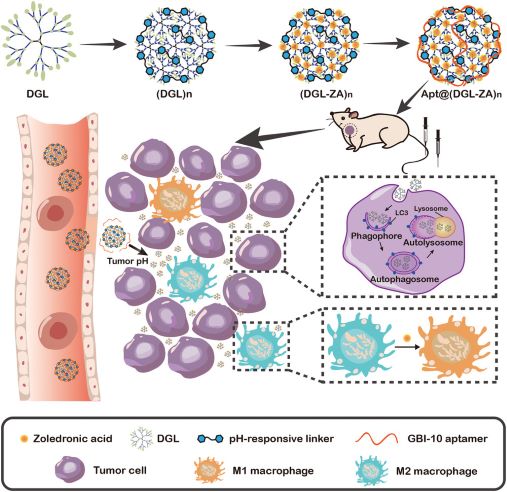Advanced Science:Dandelion-like Tailorable Nanoparticles for Tumor Microenvironment Modulation
Time:2019/11/26 18:11:11 Views:1414
Recently, our research
group developed acid-triggered size-changeable nanoparticle with effective
tumor distribution, extravasation and penetration for deep tumor
microenvironment modulation. The relevant studies were published online in
Advanced Science (IF=15.808), named " Dandelion-like Tailorable
Nanoparticles for Tumor Microenvironment Modulation".
Tumor-associated
macrophages (TAMs) constitute over 50% of the number of cells within the tumor,
playing as a major player involved in tumor progression and invasion.
Remodeling the tumor immune microenvironment via modulating TAM polarization
has been emerging as a new and promising therapeutic strategy. However, the
high interstitial fluid pressure (IFP) and dense extracellular matrix lead to
insufficient penetration of nanosized therapies.
To overcome this
dilemma, we designed an acid-triggered size-changeable nanoparticle
(aptamer/acid sensitive linker crosslinked DGL/zoledronic acid, i.e.,
Apt@(DGL-ZA)n NPs) with effective tumor distribution, extravasation
and penetration. Dendrigraft poly-L-lysines (DGLs) which could induce tumor
autophagy as mimics of natural abnormal proteins was crosslinked via a
mild-acid-responsive linker (1,6-bis(4-formylbenzoyloxy) hexane). Long
circulation property and tumor penetration were achieved simultaneously by
catching DGLs in neutral pH while releasing them in tumor’s pH, like dandelion
seeds in midair. Macrophage conditioning agent zoledronic acid (ZA) was loaded
on DGLs by the charge attraction. A Tenascin-C targeting aptamer (GBI-10) was
modified onto (DGL-ZA)n NPs for tumor-homing effect. Apt@(DGL-ZA)n NPs show both enhanced penetration in in-vitro 3D TNBC spheroids and in-vivo
tumor tissues. Effective macrophage regulation, enhanced tumor autophagy and
excellent in vivo antitumor efficacy were achieved, suggesting this tactic as a
significant antitumor strategy.

https://onlinelibrary.wiley.com/doi/full/10.1002/advs.201901430

